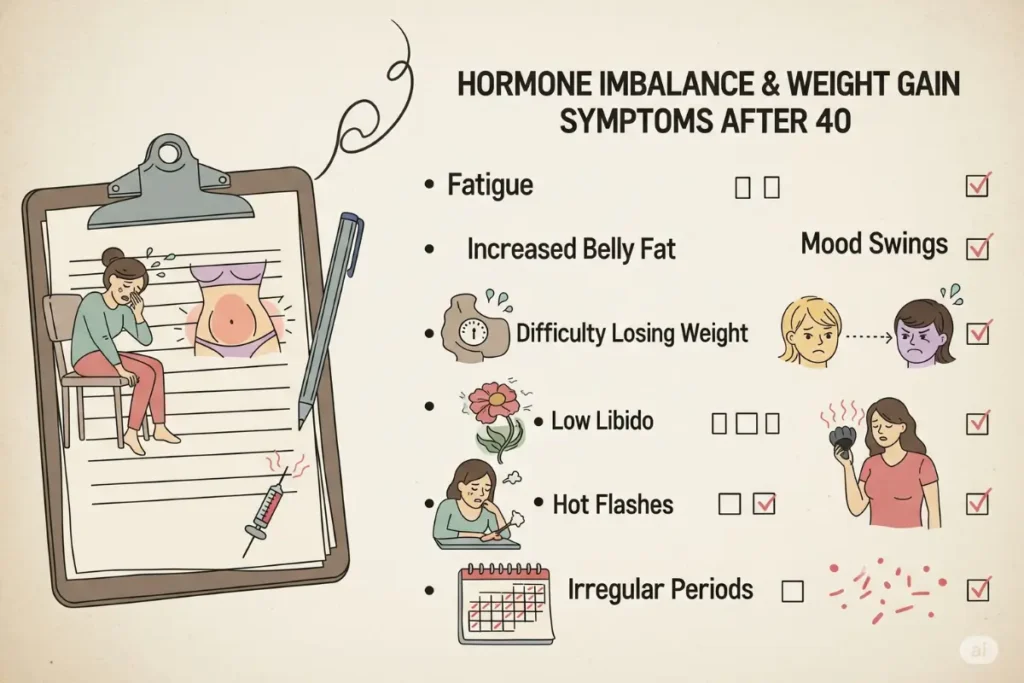Discover how understanding your unique hormone profile unlocks sustainable weight loss after 40

You eat clean, exercise regularly, and still, nothing seems to happen. That stubborn belly fat refuses to shift. If this sounds familiar, you might be experiencing hormone imbalance weight gain symptoms—a common but often overlooked issue for women over 40.
If you’re a woman over 40, this isn’t about lack of willpower. It’s not your fault. Hormonal shifts—especially during perimenopause and menopause—can hijack your metabolism, disrupt hunger signals, and stall fat loss.
Hormones like estrogen, cortisol, and thyroid hormones directly impact fat storage, appetite, and energy use. When they’re out of balance, even your best weight loss efforts can feel like pushing a boulder uphill.
In this guide, we’ll help you:
- Spot common symptoms of hormone imbalance
- Take a quick self-assessment
- Jump into seven hormone-specific strategies that work
- Learn what blood tests to ask for
- Understand how to overcome fat loss resistance
- Know when to consult a professional
Let’s decode the hormonal puzzle and reclaim your body.
Hormonal Weight Gain Symptoms to Watch
Grouped by common hormonal causes:

1. Thyroid Hormones (T3, T4, TSH):
- Fatigue
- Cold intolerance
- Dry skin
- Constipation
- Unexplained weight gain
2. Cortisol (Stress Hormone):
- Belly fat accumulation
- Trouble falling/staying asleep
- Anxiety or irritability
- Sugar cravings
- Energy crashes
- Short-term weight gain
3. Sex Hormones (Estrogen, Progesterone, Testosterone):
- Irregular periods or missed cycles
- Low libido
- Mood swings
- Bloating (may relate to progesterone fluctuations)
- Hair thinning
- Night sweats
- Fluid retention
✨ Quick Self-Assessment Quiz:
- Has your body shape shifted more toward the belly, despite no major lifestyle changes? (Yes/No)
- Do you feel tired most days even with sleep? (Yes/No)
- Are you experiencing more sugar cravings or weight gain than usual? (Yes/No)
If you answered “Yes” to two or more, hormone imbalance symptoms may be playing a key role.
7 Actionable Hormone-Friendly Fat Loss Strategies

1. Resistance Training > Cardio
Build muscle mass 3x/week using compound movements like squats, deadlifts, and push-ups. Aim for 8–12 reps per set to boost metabolism and balance insulin and testosterone levels. Strength training beats cardio for long-term fat loss and helps regulate body weight.
2. Best Exercises to Lower Cortisol
Gentle physical activity like yoga, walking outdoors, or strength training with mindful breathwork can lower cortisol levels—chronic stress and high cortisol are tied to belly fat and fat loss resistance (Mayo Clinic, NIH Review).
3. Eat a Balanced, Anti-inflammatory Diet
Include hormone-friendly foods like salmon, blueberries, and spinach. Focus on fiber-rich veggies, lean proteins, healthy fats, and complex carbs to stabilize blood sugar and reduce estrogen dominance (Endocrine Society, Visceral Fat Study).
4. Reduce Sugar and Refined Carbs
These spike insulin and worsen polycystic ovary syndrome (PCOS) and insulin resistance—leading to weight gain and a higher risk of metabolic issues (CDC, NIH).
5. Practice Daily Stress Management
Try diaphragmatic breathing, mindfulness apps, or a calming nighttime routine. Chronic stress fuels cortisol imbalances that disrupt the endocrine system. Prioritize quality sleep and daily protein intake to support leptin sensitivity.
6. Smart Supplement Support
Consider magnesium, omega-3s, vitamin D, selenium, iodine, or phytoestrogens—always consult your provider. Supplement quality varies and needs monitoring.
7. Consider Bioidentical Hormone Therapy (BHT)
It may restore hormonal balance—especially estrogen—but it’s not a first-line solution and requires careful monitoring. Not FDA-approved for weight loss; screening for cardiovascular and clotting risks is essential (FDA, NAMS).
Why Women Over 40 Struggle with Weight
Hormonal Shift ➔ Metabolic Slowdown + Stress/Sleep Impact + Medical Conditions = Weight Gain Perfect Storm
- Lower estrogen increases visceral fat storage (Visceral Fat Study)
- Chronic stress elevates cortisol, increasing belly fat and lowering muscle mass.
- Sleep disturbances raise hunger hormones like ghrelin.
Medical conditions like hypothyroidism and PCOS become more common, affecting the endocrine system and leading to weight gain (ATA). It often contributes to what many refer to as “perimenopause belly fat.”
Summary Table: 6 Hormones That Can Sabotage Fat Loss
| Hormone | Role | Imbalance Effect | Key Symptom |
|---|---|---|---|
| Estrogen | Regulates fat distribution | Visceral fat gain, insulin resistance | Belly weight gain |
| Progesterone | Mood, sleep, fluid balance | Bloating, irritability | Mood swings, cycle issues |
| Cortisol | Stress response, fat storage | Abdominal fat, muscle loss | Sleep trouble, anxiety |
| Thyroid (T3, T4, TSH) | Metabolism control | Sluggish metabolism, fatigue | Cold, tired, weight gain |
| Insulin | Blood sugar regulation | Fat storage, sugar cravings | Energy crashes |
| Leptin | Appetite/satiety signaling | Overeating, constant hunger | Never feeling full |
How to Confirm if Hormones Are the Culprit
Step 1: Track Symptoms
Use a daily journal to log energy, cravings, cycle changes, sleep, and mood.
Step 2: Get Proper Lab Testing

Request these blood tests:
- Thyroid panel (TSH, T3, T4)
- Sex hormones (Test on specific menstrual cycle days. For progesterone, test around Day 21 of your cycle.)
- Cortisol (morning & evening levels)
- Fasting insulin/glucose
Note: Functional medicine labs may use narrower reference ranges. These focus on optimal hormone balance rather than merely avoiding disease thresholds.
Step 3: Partner With a Specialist
A functional medicine doctor or endocrinologist can interpret results and customize treatment options to address hormone imbalance symptoms.
Red Flags: When to Consult a Doctor
- Sudden weight gain with no dietary change
- Hair thinning, dry skin, or cold sensitivity
- Brain fog or persistent fatigue
- Diagnosed or suspected thyroid/PCOS
- Nothing’s working despite best efforts
In some cases, medical treatment or even bariatric options may be necessary.

FAQ: Hormonal Weight Gain After 40
Yes. Hormones like estrogen, cortisol, and insulin regulate metabolism, hunger, and fat storage. Imbalances can lead to stubborn weight gain.
An anti-inflammatory, blood-sugar-stabilizing diet is key. Focus on lean protein (30g per meal), fiber (25g+ per day), healthy fats, and complex carbs. Limit sugar and processed foods.
Track symptoms and get hormone panels tested—especially thyroid, estrogen, progesterone, cortisol, insulin, and glucose levels.
Most women start to notice improvements in energy, sleep, and weight within 4–6 weeks. Full impact often takes 3–6 months.
At-home saliva kits exist, but results can be inconsistent. Blood tests, interpreted by a medical professional, remain the gold standard.
Conclusion: Take Your First Step Today
If you’ve been trying everything and the scale won’t budge, hormones could be at the root. Identifying your unique imbalance is the first step toward reclaiming energy, strength, and confidence.
Take Your First Step Today:
- Download the Hormone-Fat Loss Checklist
- Prepare your symptom journal and lab test list
- Start ONE strategy this week